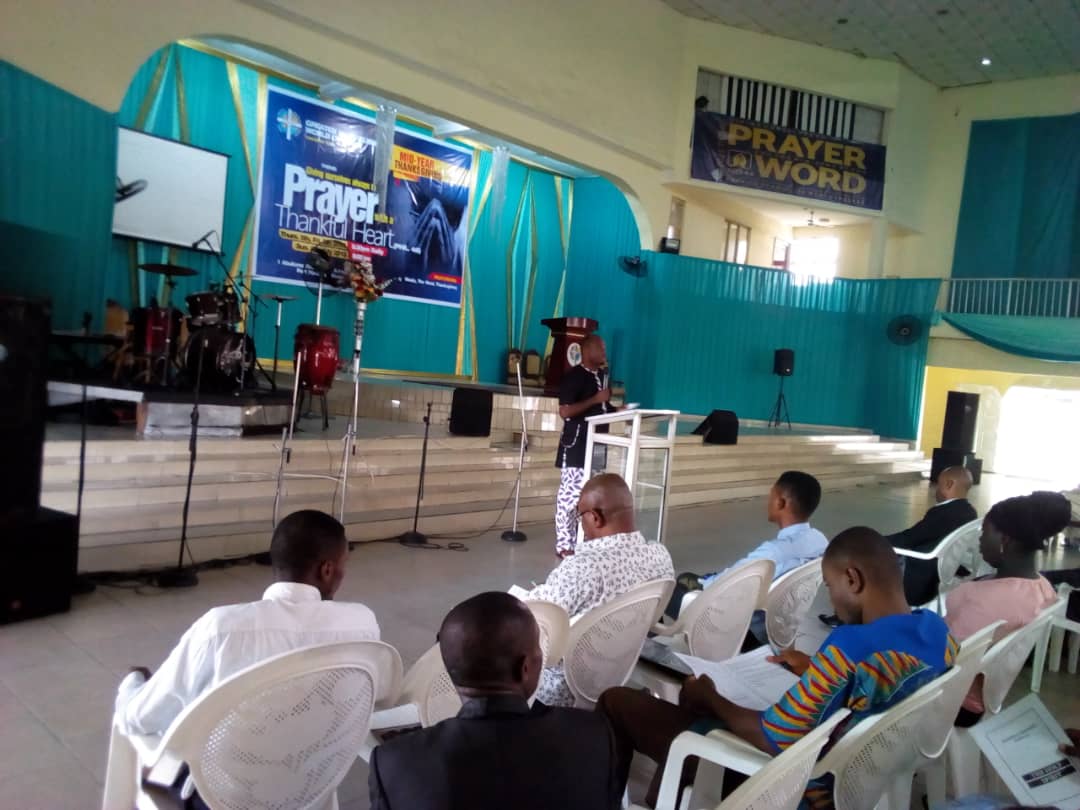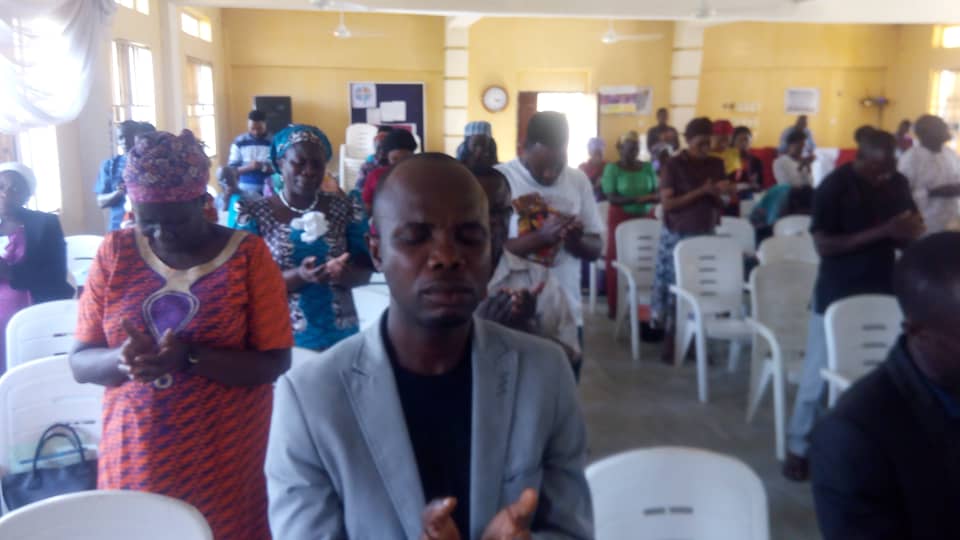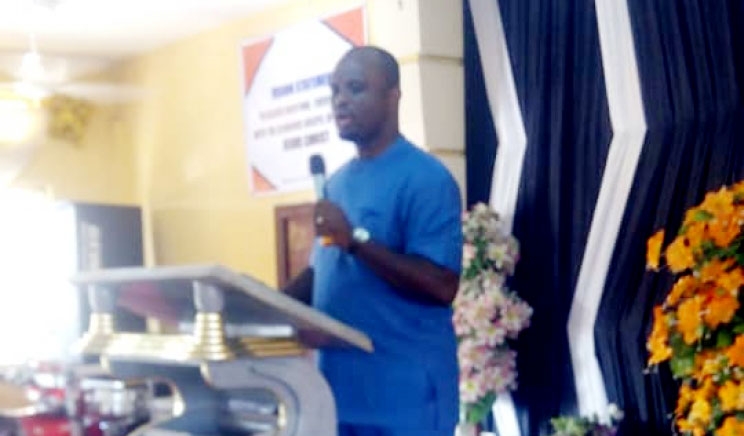The 2018 Missions Bootcamp organised by Evangelist Victor N. Ejimadu, the Chief Missions Coordinator of Greater Evangelism World Crusade and his team was held on 30th June, 2018 and 7th July 2018 in Rivers State and Bayelsa State respectively.
Evanglist Victor Ejimadu, Evangelist Mike Ojie the National Youth Minister, Church Pastors, Ministers and Elders were present. There was great moments of praise and worship, break out sessions on discipleship, Pastor Achese Amadi of Rainbow Town Church ministered on the topic “Pastoring the Community”, Evangelist Victor Ejimadu ministered on the topic “The Missional Supremacy of the Great Commission” and “the Holy Spirit”.
Evang. Victor Ejiamdu in his message (The Missional Supremacy of the Great Commission) said, Jesus began the Great Commission with the words, “All authority has been given to me in heaven and on earth” (Matthew 28:18-20). The issuance of this Commission is contextualized by the supreme authority of Jesus Christ in heaven and on earth. It comes from the highest possible authority. No authority can overrule it; no other authority can modify or change it. To fulfil the Great Commission is to obey the authority with which it was given and to fail to fulfil the Great Commission, intentionally (by disobedience) or unintentionally (by neglect) is to disobey the authority with which it was given. Clearly, this has serious significance for the Church!
The Great Commission has been historically and universally accepted as the most comprehensive statement in the Scriptures concerning the mission of the church. The question is, “Do you agree that it is?” Do you believe it is as relevant today as it was in the days in which He spoke it to the eleven?

If we really believe the Great Commission is the highest mission given to the church by our Lord and Saviour and if we believe, it is not an option but a command, then, we must commit ourselves to know it, understand it, own it, preach it, live it and above all do it. Anything else dishonours it and the One who gave it.
“Any church that is not seriously involved in helping fulfil the Great Commission has forfeited its biblical right to exist.” (Oswald J. Smith).
The Missional Supremacy of the Great Commission means it is:
- The most important mission of the Church.
- The highest missional priority of the Church.
- The defining visionary statement of the Church.
- The supreme directive under which the Church exists and operates.
- The job description of every Christian.
The missional supremacy of the Great Commission means it is not another program, method, strategy, formula or idea to add to your ministry; it is what God is doing right now.
The Apostolic Nature of the Great Commission
Jesus gave the Great Commission “to the apostles whom He has chosen” (Acts 1:2); an Apostle is one who has been sent, a delegate, a messenger. The first command in the Great Commission is “GO” (Matthew 18:19), GO is an apostolic action. Apostles are those who not only go but those who go on a specific mission, Apostles are defined by their mission. The Great Commission is a mission! The word Commission means “the act of communicating or giving a charge; an authoritative order or direction; authority granted for a particular action or function”.
There are two distinctive threads in a commission that makes it more than a plan, idea, strategy or goal. These to threads elevate a commission in significance and power. They are its authority and its specificity (what it says and means).
As we have seen, the authority in which the great commission was given is the highest authority in heaven (the spiritual realm) and earth (the natural realm). When Jesus issued the Great Commission to His disciples He was sending them to complete the specific task of making disciples of all nations. This is an apostolic (missionary) work. While not all disciples are apostles, all disciples are called to participate in an apostolic work because all are sent to the nations in some way, even if they never go to another nation themselves.
We can understand the Great Commission like this:

- Make Disciples: Make is a verb, the main action, a disciple is a follower. He is one who has dedicated his life to follow his master. To make disciples is to make followers of Christ.
- Go: It means bring people to Christ. “Go and make” not “come and see”. Go means that we are to do the work of evangelism. To make Disciples of Christ, we must bring that person to Christ to be forgiven and cleansed from his sins.
- Baptize: Bring them into the church. The Jewish communal context for baptism originally mean that it was required for conversion into the Jewish community. The word “baptize” tells us what we are to do after we have brought them to Jesus. Baptism brings them into the redemptive community of the Church. The implication is that the new believer can best follow Jesus as disciples from the context of their relationship with the church.
- Teach to observe: Bring them to spiritual maturity marked by obedience. We must bring disciples under the lordship of Christ. Jesus said we are to teach his disciples to “observe” (or obey) everything He has commanded us. However, the commands of Christ are not just rules to observe, they are a way of life.
GO + BAPTIZE + TEACH = MAKE DISCIPLES
We can translate this formula in the following way:
Evangelism (GO) +CHURCH (BAPTIZE) +OBEDIENCE (TEACH) = MAKE DISCIPLES
Four Areas Christians Have Not Made Disciples
- Christians have reduced discipleship to an academic process- a series of Bible lessons or curriculum to be studied and learned rather than a fully committed kingdom life in the Holy Spirit.
- As Christianity has become more institutionalized in its form, so also discipleship has become more institutionalised.
- Consumerism has become a leading social force of our day and is the opposite of sacrificial discipleship.
- Many Christians and Churches no longer experience the fullness of the Holy Spirit, reducing Him to the role of a theological assumption rather than an indwelling teacher.
The Power of Multiplication
If the population of China walked past you in a line single file, the line would never end because of the multiplying birth rate! Applying the power multiplication to discipleship, we can see the huge potential. If 1 person wins 1 soul per day for 1 year, we will have 365 disciples in a year. If each of those souls, win 1 soul per day for another year, we will have 730 disciples in 2 years. If this continues, in 10 years, just 1 person would have directly or indirectly won 3,650 souls for Christ. “He who does the work is not as profitable as he who multiplies the doers.” (John R. Mott)
It is clear that God has given us one thing to do – to make disciples of all the nations. My job is to make disciples! Your job is to make disciples! Our job is to make disciples! In Matthew 24:14, Jesus told His disciples “the end will come” when the Great Commission has been accomplished.
Lives were blessed as the Holy Spirit touched the people, individuals were enlightened and spurred for the evangelistic work.









